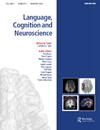形态语音和语义线索听觉处理的个体差异
IF 1.8
3区 医学
Q2 AUDIOLOGY & SPEECH-LANGUAGE PATHOLOGY
引用次数: 0
摘要
本文章由计算机程序翻译,如有差异,请以英文原文为准。
Individual differences in the auditory processing of morpho-phonological and semantic cues
ABSTRACT Morpho-phonological patterns and semantic density influence the processing of spoken complex words and contribute to the dissociation between regularly and irregularly inflected forms. However, it is unclear whether all listeners rely on morpho-phonological and semantic cues to the same degree. The present paper examines whether a listener’s cognitive profile, indicated by processing efficiency, affects the processing strategy employed when listening to morphologically complex words. Two auditory judgement experiments demonstrate that slower responders rely more strongly on semantic processing than faster responders, but all listeners show morpho-phonological effects regardless of processing speed and form effects. This demonstrates that morpho-phonological processing is automatic for all listeners, but processing efficiency determines whether additional semantic cues are engaged. The results highlight the importance of integrating cognitive variability into current models of complex word processing.
求助全文
通过发布文献求助,成功后即可免费获取论文全文。
去求助
来源期刊

Language Cognition and Neuroscience
AUDIOLOGY & SPEECH-LANGUAGE PATHOLOGY-BEHAVIORAL SCIENCES
CiteScore
4.50
自引率
13.00%
发文量
70
期刊介绍:
Language, Cognition and Neuroscience (formerly titled Language and Cognitive Processes) publishes high-quality papers taking an interdisciplinary approach to the study of brain and language, and promotes studies that integrate cognitive theoretical accounts of language and its neural bases. We publish both high quality, theoretically-motivated cognitive behavioural studies of language function, and papers which integrate cognitive theoretical accounts of language with its neurobiological foundations.
The study of language function from a cognitive neuroscience perspective has attracted intensive research interest over the last 20 years, and the development of neuroscience methodologies has significantly broadened the empirical scope of all language research. Both hemodynamic imaging and electrophysiological approaches provide new perspectives on the representation and processing of language, and place important constraints on the development of theoretical accounts of language function and its neurobiological context.
 求助内容:
求助内容: 应助结果提醒方式:
应助结果提醒方式:


